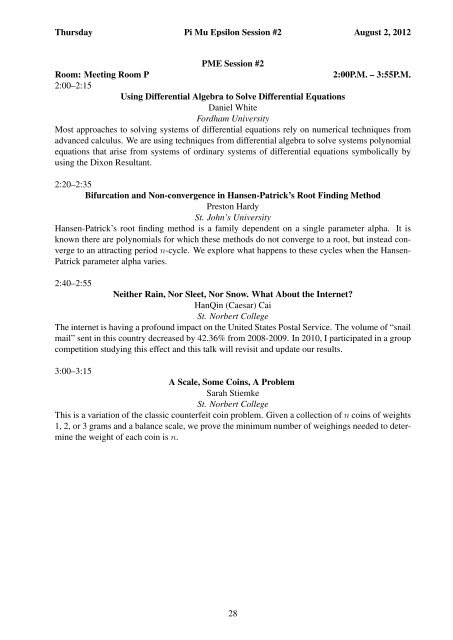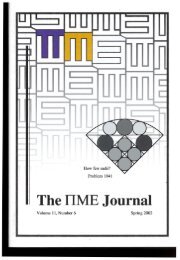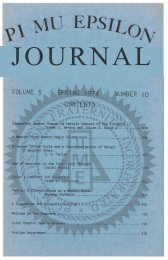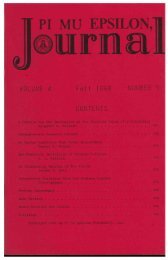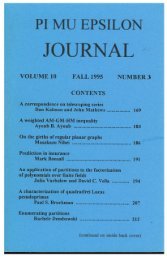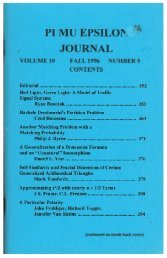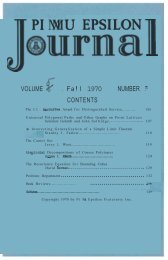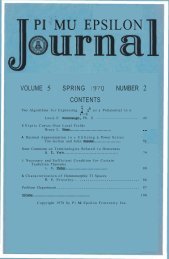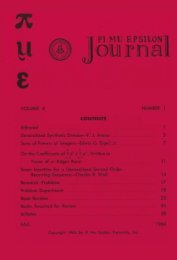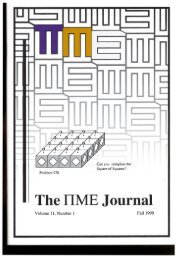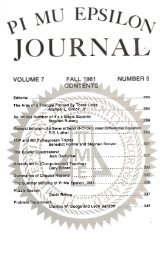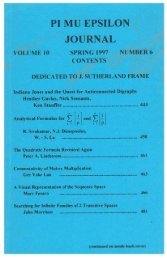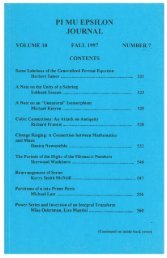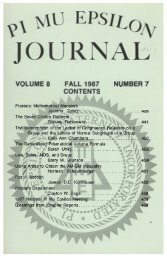Pi Mu Epsilon - Mathematical Association of America
Pi Mu Epsilon - Mathematical Association of America
Pi Mu Epsilon - Mathematical Association of America
You also want an ePaper? Increase the reach of your titles
YUMPU automatically turns print PDFs into web optimized ePapers that Google loves.
Thursday <strong>Pi</strong> <strong>Mu</strong> <strong>Epsilon</strong> Session #2 August 2, 2012<br />
PME Session #2<br />
Room: Meeting Room P<br />
2:00P.M. – 3:55P.M.<br />
2:00–2:15<br />
Using Differential Algebra to Solve Differential Equations<br />
Daniel White<br />
Fordham University<br />
Most approaches to solving systems <strong>of</strong> differential equations rely on numerical techniques from<br />
advanced calculus. We are using techniques from differential algebra to solve systems polynomial<br />
equations that arise from systems <strong>of</strong> ordinary systems <strong>of</strong> differential equations symbolically by<br />
using the Dixon Resultant.<br />
2:20–2:35<br />
Bifurcation and Non-convergence in Hansen-Patrick’s Root Finding Method<br />
Preston Hardy<br />
St. John’s University<br />
Hansen-Patrick’s root finding method is a family dependent on a single parameter alpha. It is<br />
known there are polynomials for which these methods do not converge to a root, but instead converge<br />
to an attracting period n-cycle. We explore what happens to these cycles when the Hansen-<br />
Patrick parameter alpha varies.<br />
2:40–2:55<br />
Neither Rain, Nor Sleet, Nor Snow. What About the Internet<br />
HanQin (Caesar) Cai<br />
St. Norbert College<br />
The internet is having a pr<strong>of</strong>ound impact on the United States Postal Service. The volume <strong>of</strong> “snail<br />
mail” sent in this country decreased by 42.36% from 2008-2009. In 2010, I participated in a group<br />
competition studying this effect and this talk will revisit and update our results.<br />
3:00–3:15<br />
A Scale, Some Coins, A Problem<br />
Sarah Stiemke<br />
St. Norbert College<br />
This is a variation <strong>of</strong> the classic counterfeit coin problem. Given a collection <strong>of</strong> n coins <strong>of</strong> weights<br />
1, 2, or 3 grams and a balance scale, we prove the minimum number <strong>of</strong> weighings needed to determine<br />
the weight <strong>of</strong> each coin is n.<br />
28


